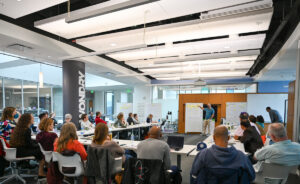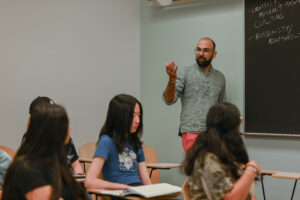The A&S College Core: redefining undergraduate education
Over the past 20 years, higher education has faced the challenges of educating students for a rapidly changing world. We are tasked with preparing our students to face a host of complex and swiftly evolving issues, from emerging technologies such as artificial intelligence, to global crises such as climate change, to the threats posed by misinformation. Our students need to be able to grapple with the complexities of this historical moment and to think critically across disciplines to develop effective solutions to the biggest problems of our time. The need for a foundational and connected education has never been more vital.
In January 2022, faculty members in the College of Arts and Science came together to discuss how the college’s curriculum can best reflect the world of today and provide students with the skills and resources to affect change. Their solution is launching this fall with an innovative, cohesive, new undergraduate curriculum: the A&S College Core.
The College Core provides students with a broad and deep education across the arts and the sciences. Built on the idea that students need to be equipped with fundamental capacities that will serve them beyond the classroom, the new curriculum will encourage exploration and curiosity, help students forge unexpected connections, and span across disciplines.
“The College Core is unique in that it not only gives students the fundamental capacities they need to succeed in an array of academic fields, but it also teaches them to apply that same thinking to the problems they will face in their careers, their communities, and their lives as citizens,” said Timothy P. McNamara, Searcy Family Dean of the College of Arts and Science. “In essence, it gives them the tools to make a positive impact on the world, and the flexibility to make that impact in whatever way they choose.”
Creating the New Curriculum
From January 2022 through May 2023, a committee of 35 faculty members from across the college conducted a thorough, evidence-based assessment of the current curriculum, AXLE, which was created in 2004, to identify any needed changes.

Spearheaded by Sarah Igo, Andrew Jackson Chair in American History and former dean of strategic initiatives for the College of Arts and Science, the committee and its 18 working groups did a deep dive, evaluating best practices in higher education, gathering data through student and faculty surveys and open houses, attending several national conferences on curriculum design and general education assessment, participating in site visits to other universities that had recently overhauled their curricula, consulting with curriculum reform specialists, and drawing on expertise from colleagues at Peabody.
In the spring of 2023, the committee presented to the full A&S faculty a completely reimagined undergraduate academic experience: the A&S College Core. The faculty overwhelmingly approved the new curriculum, which is designed to meet the changing needs of today’s students, reflect the best pedagogical practices, and prepare tomorrow’s leaders to make an impact in our complex, ever-evolving world.
Curriculum Structure
The College Core is built on the idea that students need to gain capacities during college that will serve them for life. Spanning across disciplines, these five “Core Capacities” will enable students to imagine and innovate in response to rapidly changing circumstances:
- Written & Creative Expression
- Systemic & Structural Reasoning
- Cultural & Interpretive Investigation
- Data Literacy & Computational Thinking
- Ethical & Social Engagement
Students gain these Capacities through a thoughtful and intentional set of courses, including two seminars in their first year, various electives, an inquiry lab, and a world language.
Over the fall and spring of their first year, students will take the First-Year Core, two 4-hour discussion-based seminar courses with a shared pedagogical framework and common readings and assignments. Taught by faculty across the college, these courses help students transition to college-level thinking, grapple with important issues across multiple disciplines, and learn crucial writing skills through assignments. The courses also allow for students to participate in shared discussions that will continue outside of the classroom given that all first-year students will be taking the same two seminars.
Said one student after taking the First-Year Core, “I think this class was really important because I got to hear what everyone else had to say—not just in my class, but I was able to talk to so many people at Vanderbilt that took [the course], including my roommate and friends. Every time we would write an essay, I would get to hear what other people were writing about.”
After their first year, students will take two Exploratory Core electives. Appealing to diverse academic interests, the courses range in topic, from pondering the meaning of the “good life,” to analyzing the limitations of citizenship and sovereignty, to examining the ethics of artificial intelligence. These courses give students opportunities to jump into highly challenging questions and topics that do not have a clear-cut solution.
In addition, throughout their four years students will take five Capacity courses. Students will have flexibility in the courses they select, as courses are offered in every department across the college—from philosophy to political science to physics. These courses aim for breadth and general competencies, complementing the depth and specialized skills students will gain from their major.
A particularly innovative component of the curriculum is the inquiry lab, which teaches students how to design, conduct, and analyze research. The lab can be taken in departments across the college—from the natural and social sciences to the humanities.
Rounding out the curriculum is a world language requirement to enhance student’s cultural understanding and language proficiency.
“The Core is designed to provide a breadth of knowledge that is the foundation for the more specific, disciplinary knowledge students will gain through courses taken for their major,” said Paul Stob, director of the A&S College Core and professor of communication studies. “By encouraging curiosity and exploration, and emphasizing application to real-world problems, it prepares students not only for their major, but also for their mission in life.”
Implementation
Once the curriculum was approved in spring 2023, implementation started quickly. Led by Stob and Liz Catania, associate director of the College Core and assistant professor of the practice of neuroscience, in the 2024-25 academic year the college ran 35 pilot First-Year Core courses across 24 different departments. Approximately 550 students—or half of the first-year class—took one of the pilot courses.
Stob and Catania received positive feedback from faculty collected through anonymous surveys after the pilots were completed. One faculty member said, “It was one of the most talkative and eager-to-participate groups of students I’ve had at Vanderbilt. The no-screens policy really helped with focus.”
Another faculty member expressed, “I wasn’t sure how this was going to go, but I really enjoyed the class. It was a joy to teach earnest students dealing with big life things and trying to find their footing after the professionalization required to get into a place like Vanderbilt.”

The purpose of the pilot year was to learn, adapt, and evolve the courses for maximum impact before launching. Instructors of the First-Year Core pilot courses met weekly throughout the year to share feedback, experiences, and suggestions for improvement, and their input is helping to shape the revised courses through new readings and assignments. In addition, based on their feedback students will be required to enhance their classroom learning through campus resources, such as the Writing Studio, the Career Center, the Center for Student Wellbeing, and scholarly presentations. Instructors will continue to meet weekly in the coming year to further refine the curriculum.
Along with the first-year seminars, a handful of Exploratory Core courses were also piloted. Students selected from courses such as Brain Computer Interfaces; Gene Editing and Ethics; Mathematics for the Misinformation Age; On Lying and Deception, and International Law and Organizations, among others.
“The A&S College Core is the culmination of years of work by a large number of people, and we couldn’t be more excited for its implementation,” Stob said. “So far, student responses to our pilot program have been incredible. We can’t wait to roll out the curriculum to all A&S students.”
Looking Ahead
After years of planning, the fall 2025 incoming class will be the first to fully experience the A&S College Core as their general education curriculum. They will leave Vanderbilt with a depth of understanding, a breadth of knowledge, and the ability to innovate and make connections across topics and viewpoints.
Ultimately, the A&S College Core is not focused on preparing students for one specific path. Rather, it prepares them to be effective leaders who can apply their learning and insights, making them successful professionals and citizens.
As one student who took the pilot first-year seminar said, “This class taught me the value of putting myself out there, listening actively, and keeping an open mind. I see [the benefit] of that not just for academic discussions, but for growth and connection in all areas of my life.”
